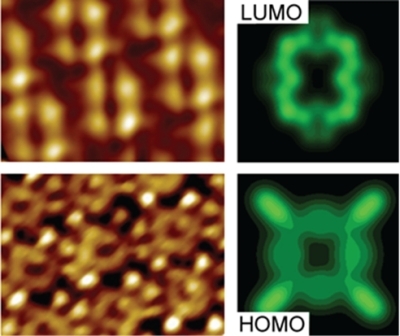Quantum mechanical calculations of nanoscale objects such as molecules and clusters help greatly in advancing our current understanding of materials and properties. They require, however, the consideration of the atomistic basis of such structures and usually employ challenging computations of quantum wave functions. MRSEC researchers at the University of Nebraska-Lincoln and their colleagues at the LNM Institute of Information Technology, Jaipur, India have combined state-of-the-art computational approaches with experiments to visualize quantum states. They studied model systems such as tetraphenyl-porphyrin molecules designed to accommodate magnetic atoms. The high spatial precision of our scanning tunneling microscope (STM) was exploited to image selected molecular orbitals. By comparing theory with experiment the researchers were able to test important quantum-mechanical concepts and understand how macroscopic properties emerge from quantum mechanics [J. Chem. Phys. C 114, 9408 (2010)].

Experimental STM images (left) of the lowest-unoccupied molecular orbital (LUMO) and the highest-occupied molecular orbital (HOMO) and theoretical calculation of the STM brightness (right).